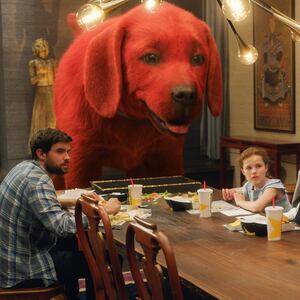This is a preview of our pop culture newsletter The Daily Beast’s Obsessed, written by senior entertainment reporter Kevin Fallon. To receive the full newsletter in your inbox each week, sign up for it here.
Charming and devastating. Humorous and profound. Whimsical and important. Personal and universal.
Nothing gives Hollywood insiders a boner quite like dichotomies. Think of it as literary Viagra. If deciding which wordplay-of-opposites to use as a film’s movie poster pull quote lasts more than four hours, consult a doctor.
That is to say that of course Kenneth Branagh’s new film Belfast, which I would use all those turns of phrase to describe, is going to win Best Picture at this year’s Oscars. This is a movie about the Troubles in Northern Ireland, set in the summer of 1969 when tensions between loyalists and republicans—Protestants and Catholics, in shorthand—boiled over into deadly violence that tore communities and families apart. It also ranks as maybe the most crowd-pleasing movie of the year. Dichotomies!
Of course, joy and sorrow aren’t polarized emotions as much as they are hopelessly intertwined with Irish people. The saddest events elicit the most raucous laughter, which quickly turn to sobs at the guilt-filled realization of how ephemeral that happiness can be. It’s a generational absurdity, with my Irish Catholic family proudly carrying on the tradition: indulging in the delights of life with as much fervor as wallowing in the depressing details of its darkness. It’s a lot of emotion, all of the time.
That is to say that the entire time I was watching Belfast, I couldn’t stop thinking, my God, my parents are going to love this movie. That’s a compliment. I think that’s why it’s going to win that big Oscar: great cast, respected and well-liked director, story that makes you feel deeply but also feel good. Plus, it took home the People’s Choice Award at the Toronto International Film Festival, just like past Best Picture winners Nomadland and Green Book. But it’s also why the film’s pole-position status is already pissing people off.
After two years of the Academy quote-unquote “finally getting it right” when it comes to Best Picture, with historic wins for indie game-changers Parasite and Nomadland, Belfast seems like a dull, far-too-expected frontrunner. While, sure, it’s not a fringe contender with provocative ideas from auteurs leading the way to the future of cinema, I think the criticism from its detractors can be reductive.
The film follows three generations of a working-class Belfast family whose lives are forever changed by the escalating violence in the neighborhood in which they’ve spent their entire lives. It begins by showing the community’s kids playing in the streets, kicking around balls, hopscotching, and pretending to be sword-fighting knights. But the frivolity turns to menace at the drop of a hat. Or, in this case, the explosion of a Molotov cocktail.
“Get the kids inside!” one concerned mother screams as a battalion of demonstrators storm the streets, hurling rocks and more firebombs through windows, into cars, and at anyone caught in the melee. The trash can lid that had been used by young Buddy (Jude Hill) during the innocent game of pretend moments before is now being wielded by his Ma (Caitriona Balfe) to deflect stones being pelted at them as she rushes Buddy to safety.
Sequences like this are made all the more harrowing because they’re largely seen through the perspective of Buddy. That prism is also what gives the film its innocence and its humor.
There’s always a risk of crashing and burning in a sea of insufferable precociousness when historical tragedy is shown through the eyes of a child, but Branagh has such a delicate hand on it and what he hopes to say about the loss of that innocence—and the desperateness to cling to it—that it works, especially with an all-time great child-actor performance from Hill.
The film is also mostly in black and white. There is a throughline about how escaping to the movies is a cathartic distraction in trying times. That has the most jaded among us rolling our eyes over how directly that panders to classic Academy tastes, specifically black-and-white movies that fetishize the magic of movies as an art of healing (see: The Artist). Add in Judi Dench and Ciarán Hinds as wise-cracking grandparents, and it might seem as if Belfast is engineered to appeal to the most base-level, unimaginative of Oscar voters.

There’s a bit of the “cool kids smoking in the alley behind the school” cynicism and bitterness to that. Yes, it checks obvious Academy-friendly boxes. But it’s also a movie about the precariousness of community, family, place, connection, and youth when an outside trauma arrives and forces you to confront what all of that means, and what you can or cannot survive without. That certainly feels familiar now.
In any case, as he should in every film, star Jamie Dornan, who plays Pa, performs a rousing musical number, a performance on a par with—if not greater than—when he sang alongside seagulls in Barb and Star Go to Vista Del Mar. That, at least, is worth the price of admission.
You can watch him recreate the performance at the film’s premiere here. All I can say is that I’ve watched it so many times while fantasizing about having him sing it to me at our future wedding that it’s a miracle there’s even a newsletter for you to read this week.






